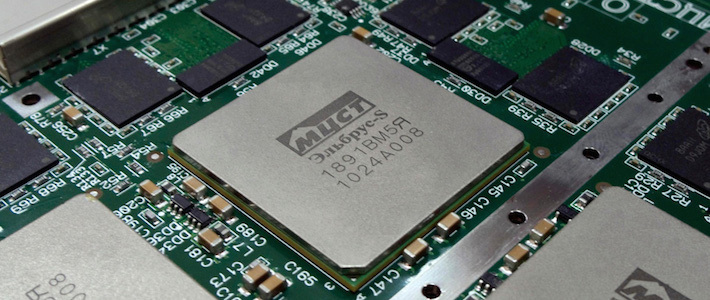 NEWS
NEWS
 NEWS
NEWS
 NEWS
NEWS
Ever since Edward Snowden lifted the lid on the full extent of the NSA’s mass surveillance programs, foreign nations have been looking for alternatives to U.S. manufactured equipment. In the wake of Snowden’s revelations, one Russian firm announced its intention to build its own homegrown microprocessors, and today these have finally gone on sale.
Moscow Center of SPARC Technologies (MCST) has announced (press release in Russian language) it’s now taking orders for its Russian-made microprocessors from domestic computer and server manufacturers. The chip, called Elbrus-4C, was fully designed and developed in MCST’s Moscow labs. It’s claimed to be the most high-tech processor ever built in Russia, and is comparable with Intel Corp’s Core i3 and Intel Core i5 processors. The Elbrus-4C chips are powered by a 4-core processors, and come with an interface for hard drives and other peripherals. The company finalized development of the chip in April 2014, and began mass production last fall.
![]() Besides the chips, MCST unveiled a new PC, the Elbrus ARM-401 (pictured, right) which is powered by the Elbrus-4C chip and runs its own Linux-based Elbrus operating system. MCST said that other operating systems, including Microsoft’s Windows and other Linux distributions, can be installed on the Elbrus ARM-401. Finally, the company has built its own data center server rack, the Elbrus-4.4, which is powered by four Elbrus-4C microprocessors and supports up to 384GB of RAM. MCST said the Elbrus-4.4 is suitable for web servers, database servers, storage systems, servers, remote desktops and high-performance clusters.
Besides the chips, MCST unveiled a new PC, the Elbrus ARM-401 (pictured, right) which is powered by the Elbrus-4C chip and runs its own Linux-based Elbrus operating system. MCST said that other operating systems, including Microsoft’s Windows and other Linux distributions, can be installed on the Elbrus ARM-401. Finally, the company has built its own data center server rack, the Elbrus-4.4, which is powered by four Elbrus-4C microprocessors and supports up to 384GB of RAM. MCST said the Elbrus-4.4 is suitable for web servers, database servers, storage systems, servers, remote desktops and high-performance clusters.
“This chip has been designed for everything connected with the extremely critical applications, such as military, information security, governance,” said Basil Moczar, an analyst with the Russian research company ITResearch, to Kommersant. “It’s priced cheaper and offers protection of information, so I do not see any problems.”
However not everyone was convinced Elbrus-4C was up to scratch with its U.S. made competitors. Sergei Viljanen, editor in chief of the Russian-language PCWorld website, told Kommersant the design was inferior to foreign chips.
“Russian processor technology is still about five years behind the west,” Viljanen said. “Intel’s chips come with a 14 nanometer design, whereas the Elbrus is built using a 65 nanometers process, which means they have a much higher energy consumption.”
Nevertheless, the Elbrus doesn’t look too shabby for a first effort, and if MCST’s promise of compatibility with other operating systems holds true, and if its performance is half decent, it should be able to drum up a bit of business with some of the more paranoid Russian and foreign companies out there.
Support our mission to keep content open and free by engaging with theCUBE community. Join theCUBE’s Alumni Trust Network, where technology leaders connect, share intelligence and create opportunities.
Founded by tech visionaries John Furrier and Dave Vellante, SiliconANGLE Media has built a dynamic ecosystem of industry-leading digital media brands that reach 15+ million elite tech professionals. Our new proprietary theCUBE AI Video Cloud is breaking ground in audience interaction, leveraging theCUBEai.com neural network to help technology companies make data-driven decisions and stay at the forefront of industry conversations.